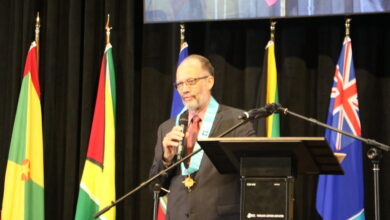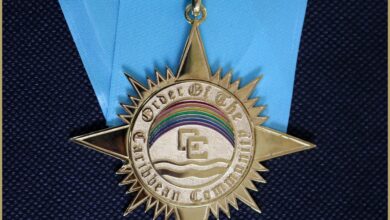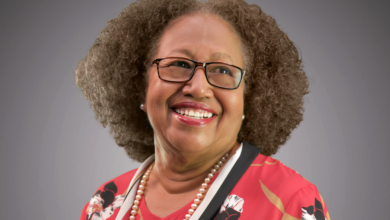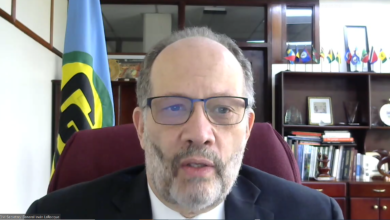(CARICOM Secretariat, Turkeyen, Greater Georgetown, Guyana) It is my honour and privilege to address this, the 33rd Regular Meeting of the Conference of Heads of Government of the Caribbean Community.
At the outset, I want to welcome the Prime Minister of Saint Lucia, Dr the Honourable Kenny Anthony to the chairmanship of CARICOM. In wishing him all success in his tenure as Chairman, I want to assure him of the full support of the CARICOM Secretariat in the exercise of his duties, as he leads the Community in the next six months.
Prime Minister Anthony I thank you, your government and the people of Saint Lucia for the excellent arrangements and generous hospitality extended to members of the Caribbean Community family, here for this meeting.
To His Excellency, Desiréé Delano Bouterse, President of Suriname and outgoing Chairman of the Community, I extend heartfelt thanks and appreciation for your leadership of the Community and your guidance and the generosity of your time to me personally during your term.
Mr Chairman, Heads of Government today will confer the Community’s highest award on Mr Kamaluddin Mohammed of Trinidad and Tobago, widely known as Mister CARIFTA, in recognition of his sterling contribution to regional integration. Mr Mohammed’s commitment to the regional cause is deeply etched in our history and this award today conveys the deep gratitude of a Region made better through his efforts.
Mr Chairman, Ladies and Gentlemen, this Meeting is taking place as the global community struggles to cope with financial, economic, and political crises. These are highlighted by the economic and financial challenges in Europe and the United States, and political problems in the Middle East.
Our Community, in this completely globalised era, is not immune from the effects and side effects of these events. As small, vulnerable, open, economies the global crisis has affected us in a disproportionate manner leaving most of our economies struggling to record growth. In the financial sector, some of our Member States are dealing with debilitating debt burdens with many of our countries characterised as small vulnerable highly indebted middle income countries. Being designated as middle income countries denies them access to concessionary financing from the International Financial Institutions which would assist in these difficult times.
To compound this situation, the European Union, which has provided assistance through its development funds, is on the brink of graduating the Region out of access to their current level of funding. This latest situation is added to the fact that the flows of development assistance to CARICOM countries have been decreasing and at least in the short term will continue to do so. This is due to the global contraction in bilateral aid arising from the problems in the Eurozone and the relative shift of the financial resources of the International Financial Institutions (IFIs) to economic rescue and stabilization of European economies among other reasons.
In such an atmosphere it is not surprising that there would be those who would seek to strike out against multilateralism and cast it as a contributor to the challenges of their individual nations.
For our part, the challenge is to create a competitive society and raise economic growth rates and sustain them in the medium and long term. The choice that we have made and the most effective means, given our individual constraints, to accomplish this, is through regional integration including the CARICOM Single Market and Economy. This enterprise has engaged us for some time now and while there has been progress, there is no denying that we should have been further advanced in critical areas. Included in those critical areas is one that is dear to the hearts of our people, the ability for our citizens to move throughout the Region in the exercise of their rights which the Treaty has conferred upon them, as well as the ability to engage in hassle free travel. This creates the perception in the minds of some that CARICOM has not lived up to the expectations of the people of the Region. However, we need to remind ourselves that integration has never been about the CSME alone. This Community is multi faceted and has proven its value to its citizens in health, education, youth development, disaster management and promoting its interests in the international arena.
Since my assumption of office last August, I have travelled through many of the Member States talking with and listening to all stakeholders, governments, the opposition, business, youth, media and non-governmental organisations. The people whom I have met do not mask their concerns over elements of the integration process; they do not hide their disappointment at the slow pace of implementation of decisions that they see as vital to their sense of community; they speak loudly about the need to create a regional environment that would be conducive to the ease of doing business throughout the Single Market; they express anguish at the difficulties experienced at ports of entry in the Community. But in the midst of all their frustrations they see integration as the only way to achieve the viable, sustainable and prosperous life that they seek. They express hope that we will build a true Caribbean Community for the improvement of the lives of our peoples. They want us to make integration work for them.
This is in keeping with the vision of our Heads of Government. Just over a year ago, our Leaders outlined priorities and set goals to propel our integration movement forward; to put people at the centre of the integration process; and to ensure that integration makes an impact on the everyday lives of our citizens. The integration construct must move from theoretical concepts to pragmatic actions to improve the lives of our people.
Discussions at this meeting will include consideration of strategic approaches to advance our integration. Our leaders will seek to determine what needs to be addressed to make our integration arrangements more relevant, attractive and appealing, not merely for implementation but to drive the growth and economic development of the Member States.
Heads of Government will also discuss in the coming days redefining the thrust of our foreign policy approaches to more effectively pursue our interests. They do so against the background of profound geo-political changes and shifts in the global balance of power.
They are aware that whatever the strategies adopted to advance our interests must be designed to take account of those global shifts.
The convening of this Meeting therefore allows our Heads of Government a further opportunity to explore avenues for collective action aimed at guiding the Community safely through these rough times and to chart the way forward to a sustainable future.
Mr Chairman, Heads of Government, distinguished delegates, this is a time for more integration, for it is through acting in concert that we can both survive and prosper and provide the people of our Community with opportunities to improve their lives. That is the objective that we set for ourselves and that is the objective that we must accomplish. And finally may I state categorically that CARICOM is not in crisis.
I thank you




